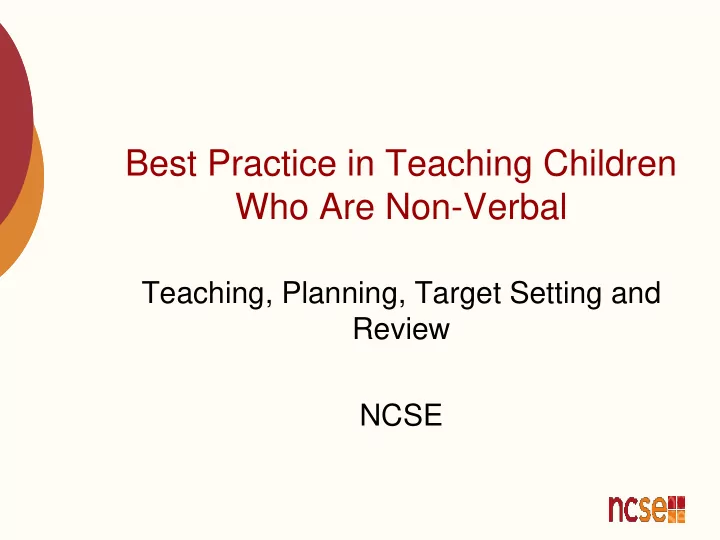

Best Practice in Teaching Children Who Are Non-Verbal Teaching, Planning, Target Setting and Review NCSE
National Council for Special Education - NCSE Building Schools’ Capacity o Develop schools ’ capacity to include students with special educational needs. o Promote a continuum of support which is inclusive and responsive. o Strive to bring about improved educational experiences and outcomes for all students.
NCSE Roles Allocate supports to schools Provide advice and support to educators, parents and guardians Undertake and disseminate research Provide policy advice to the Minister Developing post-school role for adults
What supports do we give to schools? Teaching and Learning Sensory Needs Behavioural Supports In-school Support Continual Professional Development Direct support to some students where appropriate Support for School Leaders Support Parents and Guardians Assistive Technology Allocation of Resources
www.sess.ie
What does the term non-verbal mean?
What pupils might we work with? High functioning pupils with ASD Pupils with diagnosed syndromes Pupils with multiple disabilities
Non-verbal communication ‘ The communication challenge belongs to persons with typical communication skills as well as to the pupil who has more limited use of communication’ Goetz (1993).
What can teachers do?... Create and foster a learning environment that might enhance communication, cognitive development, participation in society, social skills & independence
Non-verbal pupils and sensory processing Sensory processing difficulties
Non-verbal pupils and priority learning needs Communication skills Life skills development Cognitive skills ASD’s Social or intrinsic anxiety Howard Gardners Multiple Intelligences
Best Practice - ZPD
Best Practice - Does memory influence the development of self awareness ? Non- declarative memory Declarative Sensory / memory immediate memory Long term Working memory memory
Best Practice – Person Appropriate
Best Practice – Teaching, Planning, Target Setting & Review Priority Learning Goals: Communication & Language goal Developing cognitive skills goal Social / emotional awareness goal Self care goal Independence skill development
Best Practice – Teaching, Planning, Target Setting & Review experiencing generalising attending learning becoming responding fluent acquiring initiating
Best Practice – Teaching, Planning, Target Setting & Review SEN Pathways + Early A (under redevelopment) “indicate awareness of sensory stimuli in the learning environment” “shows consistent patterns of attending to stimuli / activities… in the learning environment”… “responds to verbal and non -verbal cues ” “shows recognition of objects of reference” “demonstrates verbal / non -verbal turn- taking” –
Best Practice – Teaching, Planning, Target Setting & Review
Best Practice – Teaching, Planning, Target Setting & Review *Under redevelopment with the NCCA
Best Practice – Teaching, Planning, Target Setting & Review
Best Practice – Teaching, Planning, Target Setting & Review Listening and attention skills Recognising and recreating sounds Relating to others in the environment Developing turn-taking skills Expressing feelings & emotions Communicating needs effectively Choosing words to labels Experiencing and recognising commands
Best Practice – Teaching, Planning, Target Setting & Review
Best Practice – Teaching, Planning, Target Setting & Review What elements should we consider when planning for non-verbal pupils? Awareness of self Awareness of others Looking Turn taking Listening Making sound/s Actions
Best Practice – Teaching, Planning, Target Setting & Review NCCA L1LPs Developing communicative relationships Developing Understanding Exploring and Using Language Reading Written expression
Teaching Approaches Self awareness skills Pupil led learning The physical, emotional and tactile environment Early reasoning & cognitive skills The concept of choices & choice-making skills
Teaching approaches and target setting What is the pupil’s personal world experience? How stimulating is the learning environment? What is the pupil’s repertoire of receptive / expressive language (what does s/he respond to)? Can the pupil engage in choice making? What are this pupil’s communication strengths? What are this pupil’s cognitive strengths? What skills would we like to further develop in this pupil?
Teaching approaches and target setting Learning through senses Organising the environment Forms of communication PECS, LAMH, ISL, Assistive Technology The use of functional assessments Appropriate planning Record keeping
Some resources
Contact details NCSE c/o Cork Education Support Centre, The Rectory Western Road Cork Web: www.sess.ie NCSE Phone: 021 425 4241 c/o Navan Education Support Centre, E-mail: info@sess.ie Athlumney Navan Co. Meath Web: www.nbss.ie Phone: 046 909 3355 E-mail: nbss@ecnavan.ie
Recommend
More recommend